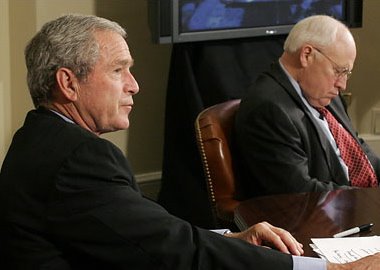Usually I get an idea for a topic and if I let it germinate, phrases begin to pop into my head, ways of explaining what I'm thinking. Get enough of those and I hit "New Post". Today I confess I'm still germinating, but I'm giving it a stab anyway.
Watching the Congress wrangle back and forth, you start to wonder what is wrong with us. Why can't we move forward on important issues that matter? Why is everything so hard?
First of all, I will point out that since 1994 we have watched a Congress who was controlled by one party, and since 2000 with a neat little Executive Branch to match. So you didn't see wrangling, compromise, politics. Granted, you saw nothing at all except the poor Shiavo family being torn apart by Frist (oh, if my parents didn't read this, what a name I usually call him!) and Delay (who has enough stupid names already). But specifically you didn't see the kind of back-and-forth, I'll-block-you until-you-say you'll-vote-for my-thing, icky-sausage-making that usually constitutes politics. So I'd say we're just not used to this. Also, those of us in the wilderness (that is, not GOP, whatever you are) found voices and politicians that we liked and who said the right things, but they were in the wilderness with us, not in the sausage factory, to mix a metaphor. Like a candidate with no experience, it's easy to rally behind people until they get down to the real work of politics. As soon as they walk into that sausage factory we call a government, we don't like what we see as much.
But more than that, it's been especially hard to watch the wrangling this time, and this time, the wrangling itself seems harder. I think it's because the politics go as politics go-- you don't have enough votes to pass something, you stick something on it to sweeten it, like a minium wage increase-- but the issues are suddenly so dire.
Let's say for example that all this wrangling and vetoes and everything we've seen regarding the Iraq supplemental was instead about No Child Left Behind. I don't like NCLB, but if the GOP said, wait until September, let's see if our surge (let's say in this case, of teachers or money) has any results, I'd be OK with that. Or let's say he needs to reauthorize the money for NCLB, but the opposition doesn't want to. They pass a bill that gives him the money but says that each school must show a 10% improvement by next spring. He vetoes it. They come back with another version, this time without the timelines, and he passes it, all the while saying, just give me until September, let's see how summer school went, let's see if the kids' test scores are up by the fall.
Well, you know what, I'd be fine with that. Politically speaking, to compromise and say, "OK, we won't shove this down your throat, we'll give you three more months to try to make it work, because we all want it to work, we all want what's best, we can compromise on that," is perfectly reasonable, and probably wise. Let his surge of teachers fail, as it will because that isn't the problem, and then we can move on.
The only problem is, when we took off on Monday to honor our war dead, eight more soldiers were added to that list. I don't know how you calculate averages on such a thing, but at that rate, 720 more American men and women would DIE before we "check in" in September to "see how it's going", and an untold number of Iraqis as well.
There's nothing really wrong with the way politicians are going about this, because like in our NCLB example, compromise and allowing other ideas to be tried is what politics are all about. And for those like Ted Kennedy or Orrin Hatch, politicians who have been around for a long time, this is how they are used to operating. I don't think blame should be assigned for that.
The real reason it's so hard is that we don't have another system set up to deal with the dire realities. This one is fine for arguing about education or immigration, but not so good for war. Congress, particularly the Senate, is meant to be slow and deliberative. Slow and deliberative are killing us, literally, in this context. We need an Express Lane for Congress. Oh, wait, we had one, it was called "one party rule". Things went by fast, but they also suffered from groupthink and Bush-worship, and the decisions made were awful. So maybe slow and deliberative is good, even in war?
Perhaps. But it's hard to look into the eyes of the parents and families of soldiers and say that.
I gotta run, I hope I did this topic some service. Please feel free to comment!
Thursday, May 31, 2007
Why it's all so hard
Posted by
LMP
at
10:08 AM
![]()
Labels: Congress, depressing world news, GOP
Subscribe to:
Post Comments (Atom)






No comments:
Post a Comment